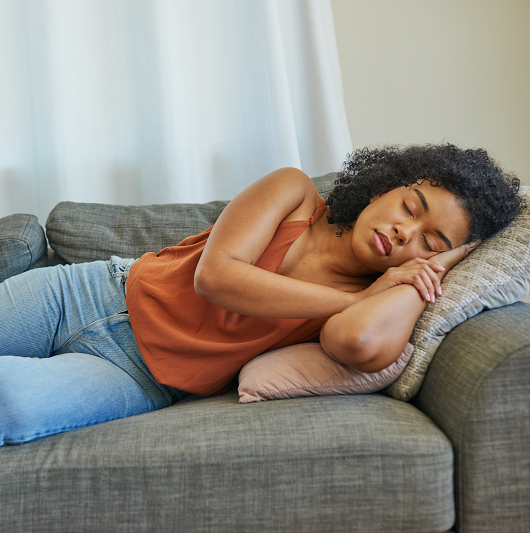Should You Consider an At-Home Sleep Study?

May 12, 2020
By: Katie Woehnker
Sleep disturbances are quite common, especially when dealing with high-anxiety situations like the coronavirus pandemic, however, is it more than stress? Sleep apnea affects about one in four people in the United States and can affect health and quality of life. But 90 percent of those with sleep apnea don't even know they have it.
John Villa, D.O., medical director of the sleep lab at Hackensack University Medical Center, and Adrian Pristas, M.D., medical director of Sleep Medicine at Bayshore Medical Center and Riverview Medical Center, share why we need to take sleep apnea seriously, and how at-home sleep testing might be a good option during the stay-at-home measures of COVID-19.
What is sleep apnea?
While snoring is a common sign of sleep apnea, the disorder is about much more than noisy sleeping. Obstructive sleep apnea happens when muscles in the back of the throat fail to keep your airway open as you sleep, blocking your ability to breathe freely for several seconds or over a minute at a time—as frequently as 30 or more times an hour.
"People with sleep apnea may wake up many times a night, often without even knowing it, and can feel tired the next day because they're not getting enough restorative sleep," explains Dr. Villa. "And other problems could develop, such as high blood pressure, heart problems and weight gain."
Sleep apnea can also impair nervous system function. "It's a significant issue because people who don't sleep well night after night are more likely to have thinking problems and daytime drowsiness, which also increases the risk of motor vehicle accidents," adds Dr. Pristas.
There's also a higher rate of depression, moodiness and headaches. Some people with sleep apnea experience reduced sex drive and impotence.
Do I have sleep apnea?
Here’s a quick quiz to see if you may be at risk for sleep apnea. Take note of your “yes” or “no” answers:
- Have you been told that you snore?
- Do you often feel tired during the day?
- Do you know if you stop breathing or has anyone told you that you stop breathing while you are sleeping?
- Do you have high blood pressure or are you taking medication to control high blood pressure?
- Is your body mass index over 35?
- Are you age 50 or older?
- Are you a male with a neck circumference greater than 17 inches or a female with a neck circumference greater than 16 inches?
- Are you male?
The chance that you have sleep apnea is:
- Low if you answered "yes" to 0-2 questions
- Intermediate if you answered "yes" to 3-4 questions
- High if you answered "yes" to 5-8 questions
A sleep test will confirm if you have sleep apnea and your sleep specialist will then discuss various treatment options with you.
How does home sleep testing work?
Similar to testing at a sleep center, at-home testing devices monitor information such as your sleep patterns, blood oxygen, heart rate, chest motion and body movement and positions.
“At-home sleep testing has become a great resource to assess sleep patterns, especially during times like these when we have restrictions for leaving the home,” shares Dr. Pristas.
“Home testing devices have advanced, becoming more comfortable and easier to use. The Hackensack Meridian Health sleep labs are the only centers in the state of NJ to use a disposable unit,” says Dr. Pristas. “The device is shipped directly to your home and after use it can be thrown away. Along with convenience, this is a safe option for both patients and physicians during the COVID-19 crisis.”
The data collected by the testing device is reviewed by your sleep specialist who will analyze the results and develop a treatment plan, if needed.
There are a number of qualifying factors for an at-home study – depending on your health history, your physician will determine if you’re eligible for an at-home test, or if an in-lab assessment is needed.
I Have Sleep Apnea, What's Next?
Treating sleep apnea can help you achieve better health, quality of life, and overall well-being.
Possible treatment options include:
A Continuous Positive Airway Pressure (CPAP) device
A dental appliance for sleeping
Losing weight
Or possibly surgery to correct any anatomical issues that may be inferring with your ability to breath well while sleeping.
"Our team matches each patient with the treatment that best meets their needs and preferences," asserts Dr. Villa.
Next Steps & Resources
- Meet our sources: Adrian Pristas, M.D., John Villa, D.O.
- To make an appointment with a health care provider near you, call 800-822-8905 or visit our website.
The material provided through HealthU is intended to be used as general information only and should not replace the advice of your physician. Always consult your physician for individual care.
Find a doctor near me
5 Easy Tips to Clean Your CPAP

5 Easy CPAP Cleaning Tips. Dr. John Villa offers simple steps for maintaining your CPAP machine. Improve hygiene and machine lifespan. Call 800-822-8905.
When Snoring Is a Sign of a Health Problem

Snoring may signal sleep apnea. Learn about causes, symptoms, and treatments from Dr. Ngai. Get help for better sleep. Call 800-822-8905.




